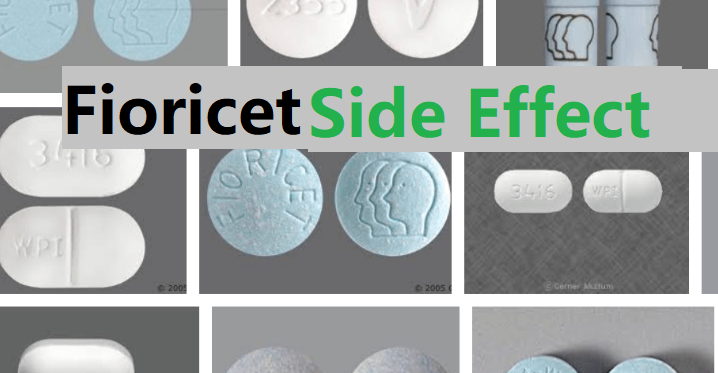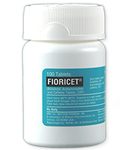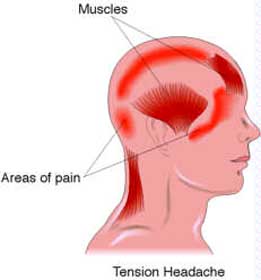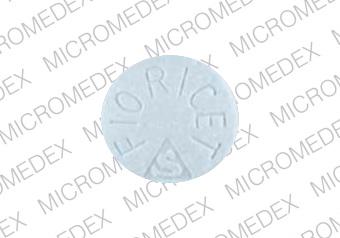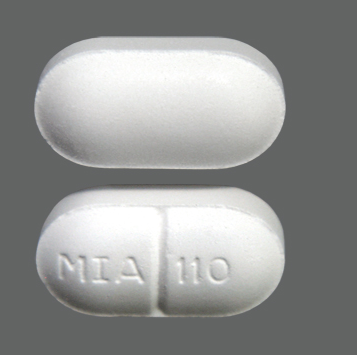Fioricet and Esgic are brand names of a combination of butalbital (a barbiturate), acetaminophen and caffeine which is indicated for the treatment of tension headaches, muscle contraction headaches and post-dural puncture headaches. Although not indicated, they are commonly used to treat migraines and other pain related ailments.
Fioricet® (Butalbital, Acetaminophen, and Caffeine Tablets USP) is supplied in tablet form for oral administration.
Each tablet contains the following active ingredients:
butalbital USP . . . . . . . . . . . .50 mg
acetaminophen USP . . . . . . 325 mg
caffeine USP . . . . . . . . . . . . .40 mg

Inactive Ingredients: crospovidone, FD&C Blue #1, magnesium stearate, microcrystalline cellulose, povidone, pregelatinized starch, and stearic acid.
Acetaminophen is a pain reliever and fever reducer. Butalbital is in a group of drugs called barbiturates. It relaxes muscle contractions involved in a tension headache. Caffeine is a central nervous system stimulant. It relaxes muscle contractions in blood vessels to improve blood flow.
Before taking Fioricet
Do not use Fioricet if you have taken an MAO inhibitor in the past 14 days. A dangerous drug interaction could occur. MAO inhibitors include isocarboxazid, linezolid, phenelzine, rasagiline, selegiline, and tranylcypromine.
You should not use Fioricet if you are allergic to acetaminophen, butalbital, or caffeine, if you have porphyria, or if you have recently used alcohol, sedatives, tranquilizers, or other narcotic medications.
To make sure Fioricet is safe for you, tell your doctor if you have:
- liver disease, cirrhosis, a history of alcoholism or drug addiction, or if you drink more than 3 alcoholic beverages per day;
- kidney disease;
- asthma, sleep apnea, or other breathing disorder;
- stomach ulcer or bleeding;
- a history of skin rash caused by any medication;
- a history of mental illness or suicidal thoughts; or
- if you use medicine to prevent blood clots.
It is not known whether Fioricet will harm an unborn baby. If you use butalbital while you are pregnant, your baby could become dependent on the drug. This can cause life-threatening withdrawal symptoms in the baby after it is born. Babies born dependent on habit-forming medicine may need medical treatment for sever
How should I take Fioricet?
Take Fioricet exactly as prescribed. Follow all directions on your prescription label. Do not take more of this medication than recommended. An overdose can damage your liver or cause death. Tell your doctor if the medicine seems to stop working as well in relieving your pain.
Butalbital may be habit-forming. Never share Fioricet with another person, especially someone with a history of drug abuse or addiction. Keep the medication in a place where others cannot get to it. Selling or giving away Fioricet is against the law.
Take Fioricet with food or milk if it upsets your stomach.
Store Fioricet at room temperature away from moisture and heat.
Keep track of the amount of medicine used from each new bottle. Butalbital is a drug of abuse and you should be aware if anyone is using your medicine improperly or without a prescription.
Fioricet dosing information
Usual Adult Dose of Fioricet for Headache:
Acetaminophen 300 mg, butalbital 50 mg, and caffeine 40 mg:
1 or 2 capsule(s) orally every 4 hours as needed. Maximum daily dose: 6 doses.
Acetaminophen 325 mg, butalbital 50 mg, and caffeine 40 mg:
1 or 2 tablet(s), capsule(s), or tablespoonful(s) orally every 4 hours.
Maximum daily dose: 6 doses
Acetaminophen 500 mg, butalbital 50 mg, and caffeine 40 mg:
1 tablet or capsule orally every 4 hours.
Maximum daily dose: 6 doses
Acetaminophen 750 mg, butalbital 50 mg, and caffeine 40 mg:
1 tablet orally every 4 hours.
Maximum daily dose: 5 tablets
Usual Pediatric Dose of Fioricet for Headache:
12 years and older:
Acetaminophen 300 mg, butalbital 50 mg, and caffeine 40 mg:
1 or 2 capsule(s) orally every 4 hours as needed. Maximum daily dose: 6 doses.
What happens if I miss a dose?
Since this medicine is used when needed, you may not be on a dosing schedule. If you are on a schedule, use the missed dose as soon as you remember. Skip the missed dose if it is almost time for your next scheduled dose. Do not use extra medicine to make up the missed dose.
What happens if I overdose?
Seek emergency medical attention or call the Poison Help line at 1-800-222-1222. An overdose of Fioricet can be fatal.
The first signs of an acetaminophen overdose include loss of appetite, nausea, vomiting, stomach pain, sweating, and confusion or weakness. Later symptoms may include pain in your upper stomach, dark urine, and yellowing of your skin or the whites of your eyes.
Overdose symptoms may also include insomnia, restlessness, tremor, diarrhea, increased shallow breathing, uneven heartbeats, seizure (convulsions), or fainting.
What should I avoid while taking Fioricet?
This medication can cause side effects that may impair your thinking or reactions. Be careful if you drive or do anything that requires you to be awake and alert.
Avoid drinking alcohol. It may increase your risk of liver damage while taking acetaminophen.
Ask a doctor or pharmacist before using any other cold, allergy, pain, or sleep medication. Acetaminophen (sometimes abbreviated as APAP) is contained in many combination medicines. Taking certain products together can cause you to get too much acetaminophen which can lead to a fatal overdose. Check the label to see if a medicine contains acetaminophen or APAP.
While you are taking this medication, avoid taking diet pills, caffeine pills, or other stimulants (such as ADHD medications) without your doctor’s advice.
Fioricet side effects
Get emergency medical help if you have signs of an allergic reaction to Fioricet: hives; difficulty breathing; swelling of your face, lips, tongue, or throat.
In rare cases, acetaminophen may cause a severe skin reaction that can be fatal. This could occur even if you have taken acetaminophen in the past and had no reaction. Stop taking this medicine and call your doctor right away if you have skin redness or a rash that spreads and causes blistering and peeling. If you have this type of reaction, you should never again take any medicine that contains acetaminophen.
Stop using this medicine and call your doctor at once if you have:
- confusion, seizure (convulsions);
- shortness of breath;
- a light-headed feeling, like you might pass out; or
- nausea, upper stomach pain, itching, loss of appetite, dark urine, clay-colored stools, jaundice (yellowing of the skin or eyes).
Common Fioricet side effects may include:
- drowsiness, dizziness;
- feeling anxious or restless;
- drunk feeling; or
- sleep problems (insomnia).
This is not a complete list of side effects and others may occur. Call your doctor for medical advice about side effects. You may report side effects to FDA at 1-800-FDA-1088.
What other drugs will affect Fioricet?
Taking this medicine with other drugs that make you sleepy or slow your breathing can cause dangerous or life-threatening side effects. Ask your doctor before taking Fioricet with a sleeping pill, narcotic pain medicine, muscle relaxer, or medicine for anxiety, depression, or seizures.
Other drugs may interact with acetaminophen, butalbital, and caffeine, including prescription and over-the-counter medicines, vitamins, and herbal products. Tell each of your health care providers about all medicines you use now and any medicine you start or stop using.
Further information
Remember, keep this and all other medicines out of the reach of children, never share your medicines with others, and use Fioricet only for the indication prescribed.
Always consult your healthcare provider to ensure the information displayed on this page applies to your personal circumstances.
